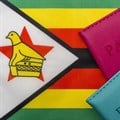About 700,000 identity documents are blocked.

The Pretoria High Court will hear a matter this week in which Lawyers For Human Rights is representing more than 100 people who have fallen victim to Home Affairs’s “arbitrary” ID blocking practice. Archive photo: Ashraf Hendricks | GroundUp
- Lawyers For Human Rights has taken Home Affairs to court over its practice of blocking IDs it thinks are in some way fraudulent.
- Approximately 700,000 IDs are blocked, yet there is no easy way to lodge an inquiry or start an investigation, according to the Children’s Institute, an amicus curiae in the matter.
- In most cases Home Affairs gives people only unclear oral explanations and no written reasons for blocking their ID.
- It is unknown how many children of parents with blocked IDs are unable to get on with their lives or receive crucial state services because of this practice.
No ID, no life. This is the fate of many children in South Africa who are victims of their parent’s IDs being “blocked” by the Department of Home Affairs.
Their births are never registered or are registered very late; their parents cannot access child support and other grants; they are excluded from or discriminated against at school; they struggle to access health care and immunisation programmes. Without an identity number they are “invisible” to the state.
These are the submissions of the Children’s Institute at the University of Cape Town, represented by the Centre for Child Law, admitted as an amicus curiae (friend of the court) in a case to be argued this week in the Pretoria High Court.
In the matter, Lawyers For Human Rights (LHR) is representing more than 100 people who have fallen victim to an “arbitrary” ID blocking practice by Home Affairs (DHA).
In December 2020, the Minister of Home Affairs revealed in Parliament that DHA was dealing with more than 800,000 blocked ID cases, involving alleged duplicates and what it claims are “fraudulent” IDs.
In September 2023, DHA admitted in its answering affidavit that "these cases have become more and more as the years went by", and that in May 2023, the Minister had agreed to remove blocks from 1.4-million people’s IDs. However, approximately 700,000 IDs remained blocked at end of July 2023.
LHR said in the past five years it had assisted more than 500 people with blocked IDs, the majority of them poor, black South Africans. None were aware of their blocked IDs until they attempted to access a service and discovered the issue “quite literally by surprise”.
None received prior notice of DHA’s intention to block their IDs, or investigate their status, nor were written reasons for the decision provided.
In the application, which is being opposed by the Minister and the department, LHR asks for an order declaring ID blocking unlawful and unconstitutional, an order that all IDs be unblocked, and an order that the department follows “just administrative action”.
The harmful impact of this on children is addressed in an affidavit by senior researcher Paula Proudlock at the Children’s Institute, using case studies of children (and their parents) which the institute is currently assisting.
She said a study by Unicef estimated that in 2017, two million eligible children had been excluded from accessing social grants in South Africa. The absence of a birth certificate or an ID card for the caregiver was the primary reason for this.
“Our own analysis of survey data revealed that children without birth certificates are more likely to be excluded from other government services, including social grants, health care, immunisation and education.”
Proudlock said the institute represented three classes of children: those who had no birth certificates, because their parent’s ID was blocked; those who had birth certificates but could not apply for ID cards when they turned 16, because their parent’s ID was blocked; and those between the ages of 16 and 18 who had IDs but whose IDs were blocked when their parent’s ID was blocked.
The majority fell into the first category; without a birth certificate the children had no access to their right to a name and nationality.
“Ultimately, they suffer significantly when they have no say or choice in the matter. It is a violation of their rights to participate in decisions that affect their rights and to have their best interests considered.”
Proudlock said the majority were poor, black and African, and were “invisible to the DHA”.
“Like someone who does not exist”
In a supporting affidavit, NZ (name withheld to protect the identity of her children) said she is a South African citizen who gave birth to triplets in July 2019 at a Durban hospital. They were born premature. When she went to DHA offices in Umgeni Road to register their births, she was advised that her ID was a “duplicate” – that she was sharing it with another person. The official told her that she was “like someone who does not exist”.
She was advised to fill in another application for an ID and submit her fingerprints and photos and told she would receive a call when the investigation was completed, but it could take at least six months.
In the subsequent months, the bank ATM swallowed the SASSA card (she was receiving a child support grant for her elder daughter), and, with the discharge from hospital of the triplets imminent, a friend raised concerns with a doctor about how she was going to cope financially.
The doctor organised colleagues to donate money, clothes and nappies.
But her situation remained dire. She was evicted from her home in January 2020. In February, a dietician at the hospital took up her cause with the DHA. But there was little progress and, at one point, a social worker advised her to give up the babies for adoption.
In November, the institute managed to arrange child support grants for the children from SASSA and, finally, the triplets’ births were registered when they were two years old.
“It is unlikely her case would have been resolved if she had not gone to the media and if the hospital dietician had not been advocating on her behalf by emailing DHA and reporting the matter to the public protector,” Proudlock said.
Blocked for over a decade by Home Affairs error
Citing another example, Proudlock said a 12-year-old girl, living with her paternal grandmother in the Eastern Cape, still had no birth certificate because the ID of her mother, who is a South African citizen, had been blocked for over a decade for being a duplicate.
The “duplication” was caused by a DHA error when two young people, both with the same name, applied for the IDs at similar times in 2002.
“We have been able to ascertain that the East London DHA office issued IDs to both, but swapped their dates of birth by mistake. One applied for a correction and was issued with a new ID with her correct date of birth. At this stage, a ‘shared ID profile’ appears to have been created. And DHA now only has one FN (name withheld) on their system,” she said.
Proudlock said the child had been sent to the Eastern Cape because, without a birth certificate, her mother could not enrol her at a school in Cape Town.
It was easier to get admission to rural schools without a birth certificate.
“She has thus grown up separated from her mother, father and younger siblings.”
Hedda Schensema and Taryn York 30 Jun 2023 No proper recourse
Regarding children who have birth certificates, but cannot get an ID because their parent’s ID is blocked, Proudlock said many of these children could not write matric, receive their matric results or register for tertiary education.
They cannot open bank accounts, register their cellphone or apply for NSFAS funding.
“Their chances of becoming employable are significantly reduced. And some become depressed and suicidal, with no hope,” she said.
Children who have IDs which get blocked at the same time as those of their parents suffer the same consequences. In addition, they cannot apply for learner’s licences or driver’s licences, apply for social grants for themselves, or register any babies born to them.
“The cycle of harm is perpetuated ... many mothers we have assisted only became aware that their ID was blocked when they attempted to give notice of the child’s birth. They received no prior notice.
“They are given unclear oral explanations and no written reasons. There are no prescribed forms to lodge an inquiry or start an investigation,” Proudlock said.
“In most cases, our clients were victims of identity fraud or DHA clerical errors and yet were summarily stripped of their citizenship and identity without notice or explanation and are then required to bear the onerous burden of re-proving their birth, identity and citizenship. If they were orphaned or abandoned when they were a child, which many of the mothers we are assisting were, then it is impossible to produce the proof DHA demands.”
Supporting the relief sought by LHR, the institute said it also wanted statistics on the number of children adversely affected by ID blocking, as the numbers DHA has provided are for blocked adults and do not account for the thousands of children whose lives are also on hold.
The hearing has been set down for 20 and 21 September.
This article was originally published on GroundUp.
© 2023 GroundUp. This article is licensed under a Creative Commons Attribution-NoDerivatives 4.0 International License.







































